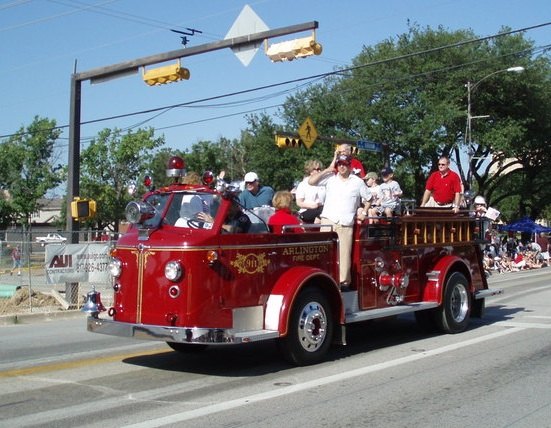Texas Cities Defy House Attempt to Ban Red Light Cameras
At least two Texas cities are openly defying the will of the state House of Representatives which earlier this month voted 107-36 to ban red light cameras. Texas lawmakers, unlike their counterparts in other states, decided to allow cities with existing red light camera contracts to keep issuing citations until those contracts expired on their own. The proposed law would then prohibit any new contracts after June 1. This week, the cities of Arlington and Southlake took a slap at that generous exception. Arlington’s city council on Tuesday unanimously decided to change the city’s five-year contract with American Traffic Solutions into a twenty-year contract.
Long-term photo contracts are rare in the US as cities—such as Scottsdale, Arizona and Washington, DC— prefer to have the ability to switch contractors to ensure a competitive bidding process. Arlington decided to bind future councils for nearly twenty years after a debate that lasted a full twenty-five seconds.
“I’d like to make a motion to approve 7C5 with the additional stipulation that we limit staff’s ability to negotiate and execute the modification with American Traffic Solutions to include an out for the city,” the only city councilman to speak on the matter said.
The Southlake City Council likewise ordered the city attorney to work on a long-term contract extension with Australia’s Redflex Traffic Systems. If the experience of other states is any guide, however, Arlington and Southlake could find their clever move backfire. In a similar circumstance last month, a number of Montana state lawmakers were incensed by cities attempting to adopt new contracts before a legislative deadline for a camera ban containing a large exception.
“We saw a couple municipalities rush to get contracts signed before the effective date of the bill — which I found offensive,” Montana state Senator John Brueggeman (R-Polson) said.
Montana legislators fired back by stripping the exceptions and imposing a total ban.
Arlington city leaders are not only defying the state House, they may also be defying the will of voters. Although the city’s residents have never had the opportunity to vote on the issue of red light cameras directly, they came close in February 2003. Fifty-eight percent of voters had shot down a bond package known as Proposition 6, the first time a bond proposal for expanding street capacity had ever been rejected in the city.
The most controversial aspect of the proposition was setting aside extra money for surveillance “traffic cameras” which critics at the time said would serve as a precursor to red light cameras. Nine months later, the bond measure was split into two distinct provisions and placed once again on the ballot. When asked in a separate vote to spend $400,000 for “traffic management cameras,” 64 percent of voters said “no.”
The full Texas Senate must now weigh in on the question of whether red light cameras should be banned. If state senators disagree with the House attempt to ban cameras, a conference committee will be called to work out a compromise measure before sending the final bill to the governor for his signature.
More by The Newspaper
Latest Car Reviews
Read moreLatest Product Reviews
Read moreRecent Comments
- FreedMike If Dodge were smart - and I don't think they are - they'd spend their money refreshing and reworking the Durango (which I think is entering model year 3,221), versus going down the same "stuff 'em full of motor and give 'em cool new paint options" path. That's the approach they used with the Charger and Challenger, and both those models are dead. The Durango is still a strong product in a strong market; why not keep it fresher?
- Bill Wade I was driving a new Subaru a few weeks ago on I-10 near Tucson and it suddenly decided to slam on the brakes from a tumbleweed blowing across the highway. I just about had a heart attack while it nearly threw my mom through the windshield and dumped our grocery bags all over the place. It seems like a bad idea to me, the tech isn't ready.
- FreedMike I don't get the business case for these plug-in hybrid Jeep off roaders. They're a LOT more expensive (almost fourteen grand for the four-door Wrangler) and still get lousy MPG. They're certainly quick, but the last thing the Wrangler - one of the most obtuse-handling vehicles you can buy - needs is MOOOAAAARRRR POWER. In my neck of the woods, where off-road vehicles are big, the only 4Xe models I see of the wrangler wear fleet (rental) plates. What's the point? Wrangler sales have taken a massive plunge the last few years - why doesn't Jeep focus on affordability and value versus tech that only a very small part of its' buyer base would appreciate?
- Bill Wade I think about my dealer who was clueless about uConnect updates and still can't fix station presets disappearing and the manufacturers want me to trust them and their dealers to address any self driving concerns when they can't fix a simple radio?Right.
- FreedMike I don't think they work very well, so yeah...I'm afraid of them. And as many have pointed out, human drivers tend to be so bad that they are also worthy of being feared; that's true, but if that's the case, why add one more layer of bad drivers into the mix?


































Comments
Join the conversation
If I know Texans, they will be using certain static objects for target practice. And I DO know Texans. They can only be pushed so far.
These cities better hope that the Texas legislature doesn't decide to totally ban the cameras in the state. I haven't seen their contracts, but they might be liable for some massive penalties if they sever the agreement.